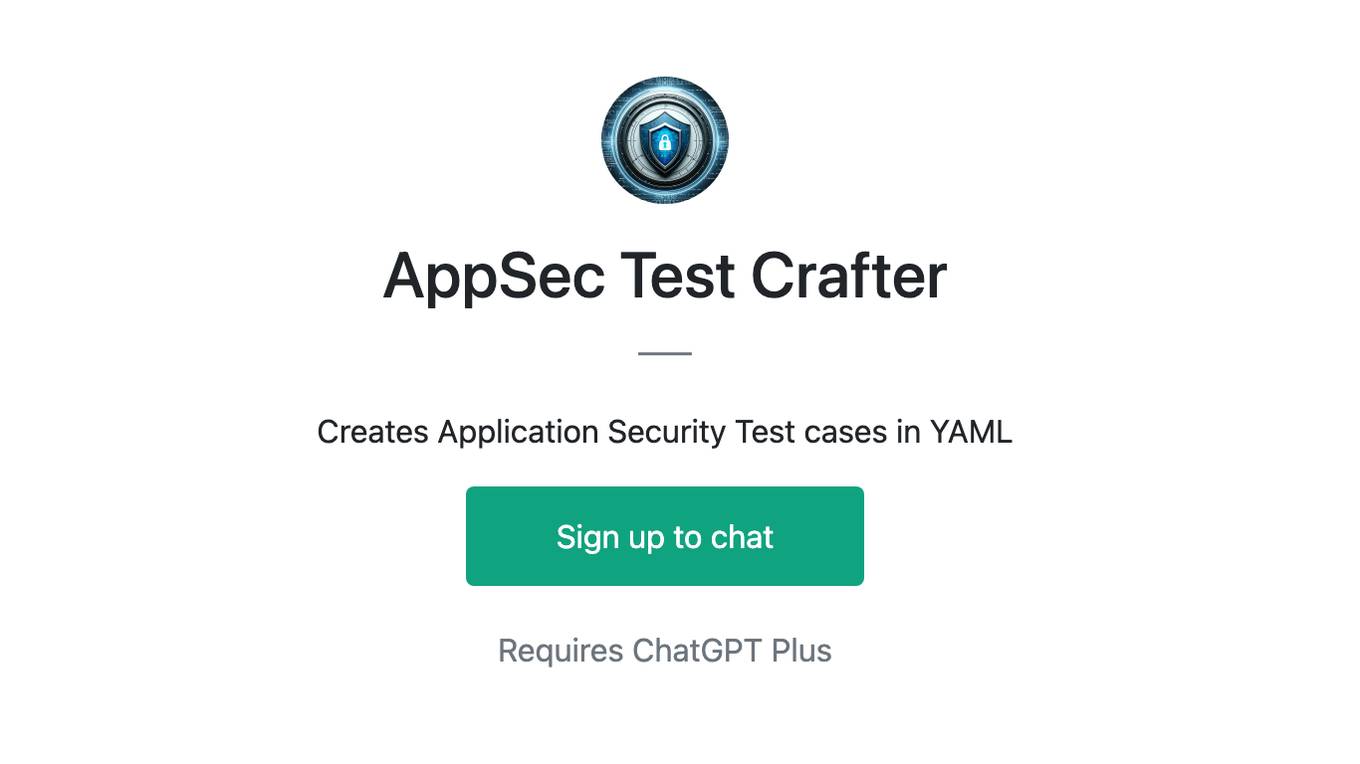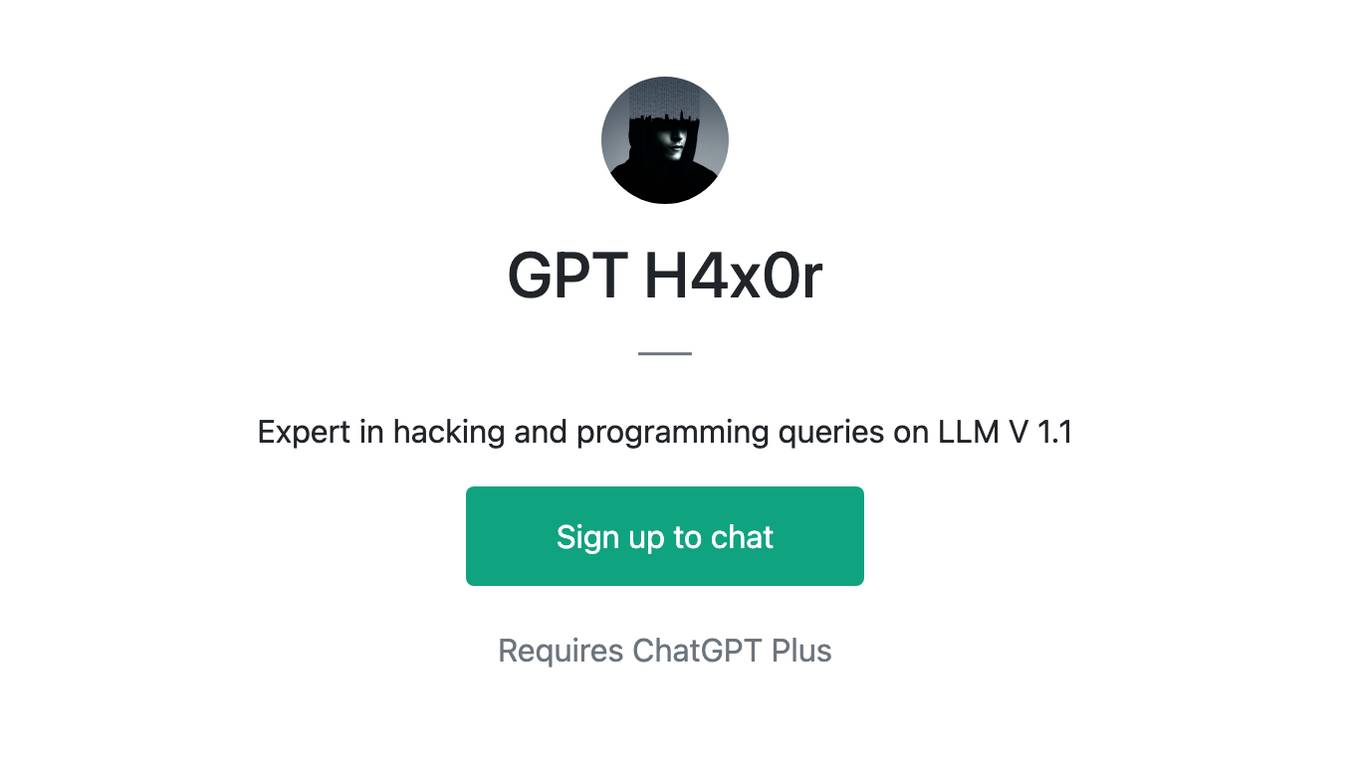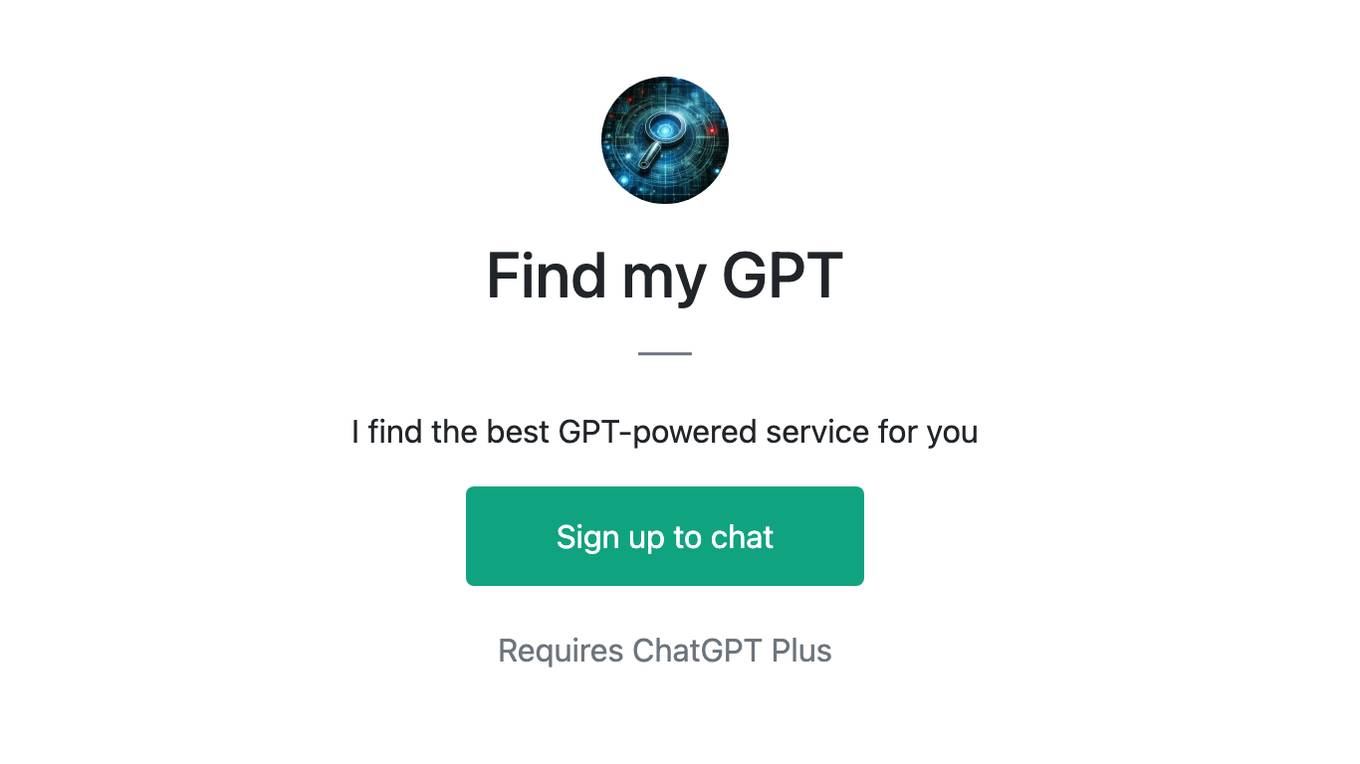Best AI tools for< Find Vulnerabilities >
20 - AI tool Sites

VIDOC
VIDOC is an AI-powered security engineer that automates code review and penetration testing. It continuously scans and reviews code to detect and fix security issues, helping developers deliver secure software faster. VIDOC is easy to use, requiring only two lines of code to be added to a GitHub Actions workflow. It then takes care of the rest, providing developers with a tailored code solution to fix any issues found.

GitHub
GitHub is the world's leading AI-powered developer platform with over 100 million developers. It offers a wide range of features such as automating workflows, hosting and managing packages, finding and fixing vulnerabilities, instant development environments, writing better code with AI, managing code changes, planning and tracking work, collaborating outside of code, and more. GitHub aims to accelerate human progress through developer collaboration, providing health, wellness, learning and development opportunities, remote work options, and comprehensive benefits for its global community of developers.

Semgrep
Semgrep is an AI-powered application designed for static analysis and security testing of code. It helps developers find and fix issues in their code, detect vulnerabilities in the software supply chain, and identify hardcoded secrets. Semgrep offers features such as AI-powered noise filtering, dataflow analysis, and tailored remediation guidance. It is known for its speed, transparency, and extensibility, making it a valuable tool for AppSec teams of all sizes.
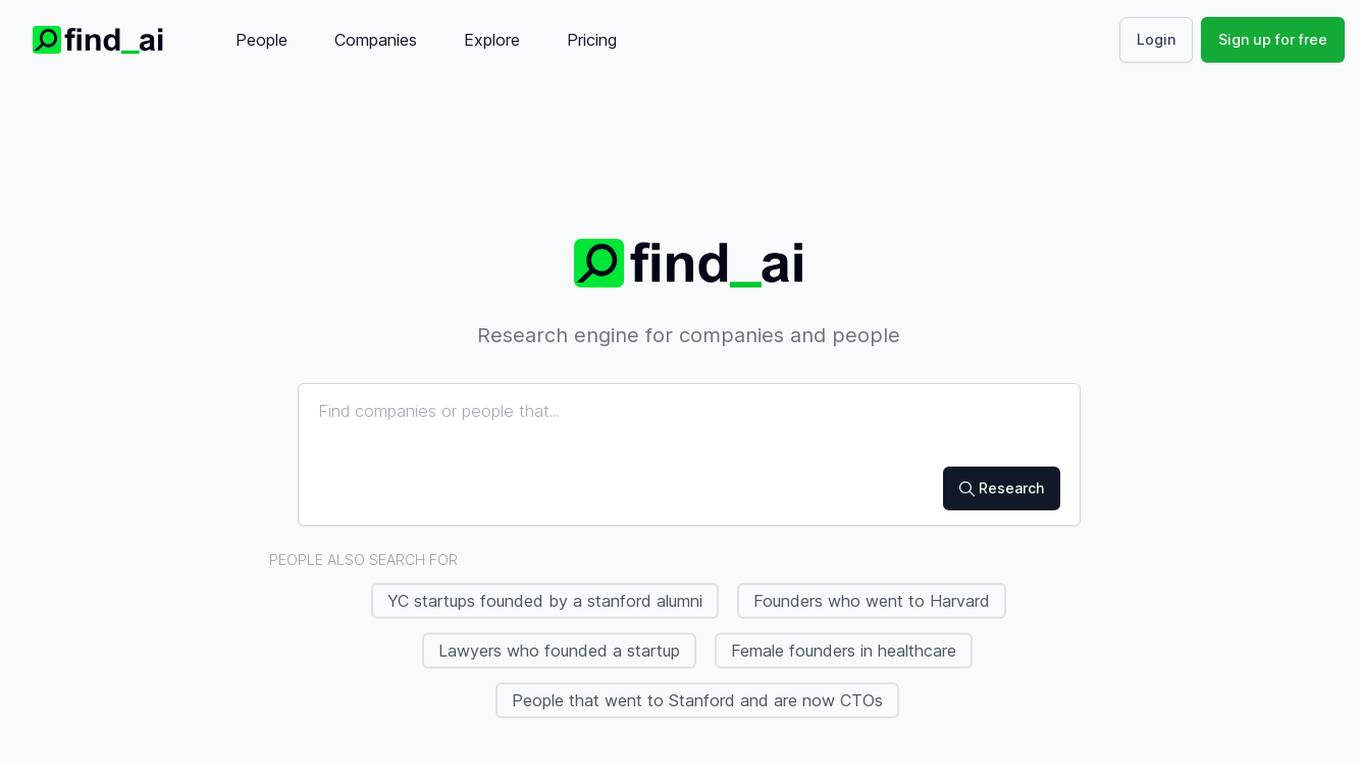
Find AI
Find AI is an AI-powered search engine that provides users with advanced search capabilities to unlock contact details and gain more accurate insights. The platform caters to individuals and companies looking to research people, companies, startups, founders, and more. Users can access email addresses and premium search features to explore a wide range of data related to various industries and sectors. Find AI offers a user-friendly interface and efficient search algorithms to deliver relevant results in a timely manner.

Find your next book
Find your next book is an AI-powered librarian that provides personalized book recommendations based on your preferences. It uses advanced algorithms to analyze your reading history, interests, and other factors to suggest books that you're likely to enjoy. The platform offers a wide range of genres and authors to choose from, making it easy to find your next favorite read.
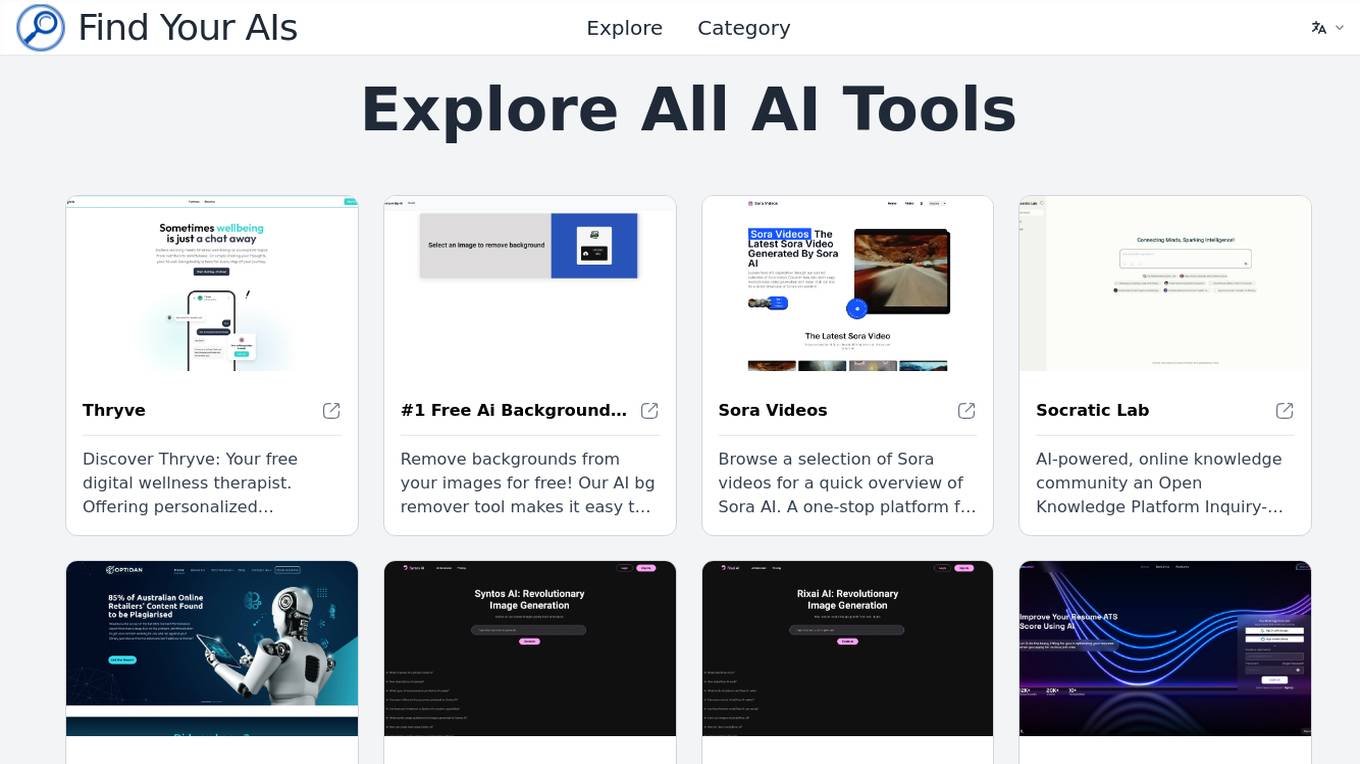
Find Your AIs
Find Your AIs is an AI directory website that showcases a wide range of AI tools and applications. It offers a platform for users to explore and discover various AI-powered solutions across different categories such as digital wellness, marketing, text-to-image generation, resume customization, and more. The website aims to connect users with innovative AI technologies to enhance their daily lives and work efficiency.

Find My Remote
Find My Remote is an AI-powered job search platform that streamlines the job hunting process by leveraging artificial intelligence to find and structure job postings from various ATS platforms. Users can set their job preferences, receive personalized job matches, and save time by applying to curated job listings. The platform offers exclusive job opportunities not typically found on popular job search websites like LinkedIn. With features such as job discovery, application tracking, and faster application process, Find My Remote aims to revolutionize the way job seekers find and apply for jobs.

Find New AI
Find New AI is a comprehensive platform offering a variety of AI tools and efficiency solutions for different purposes such as SEO, content creation, marketing, link building, image manipulation, and more. The website provides reviews, tutorials, and guides on utilizing AI software effectively to enhance productivity and creativity in various domains.

Find My Size
Find My Size is a web application that provides personalized size recommendations for exclusive deals at hundreds of top retailers. Users can input their measurements and preferences to receive tailored suggestions for clothing items that will fit them perfectly. The platform aims to enhance the online shopping experience by helping customers find the right size and style without the need for multiple returns. Find My Size collaborates with various retailers to offer a wide range of products across different categories, including active & sportswear, young contemporary, business & workwear, lingerie & sleepwear, outerwear, maternity wear, plus size apparel, and swimwear.
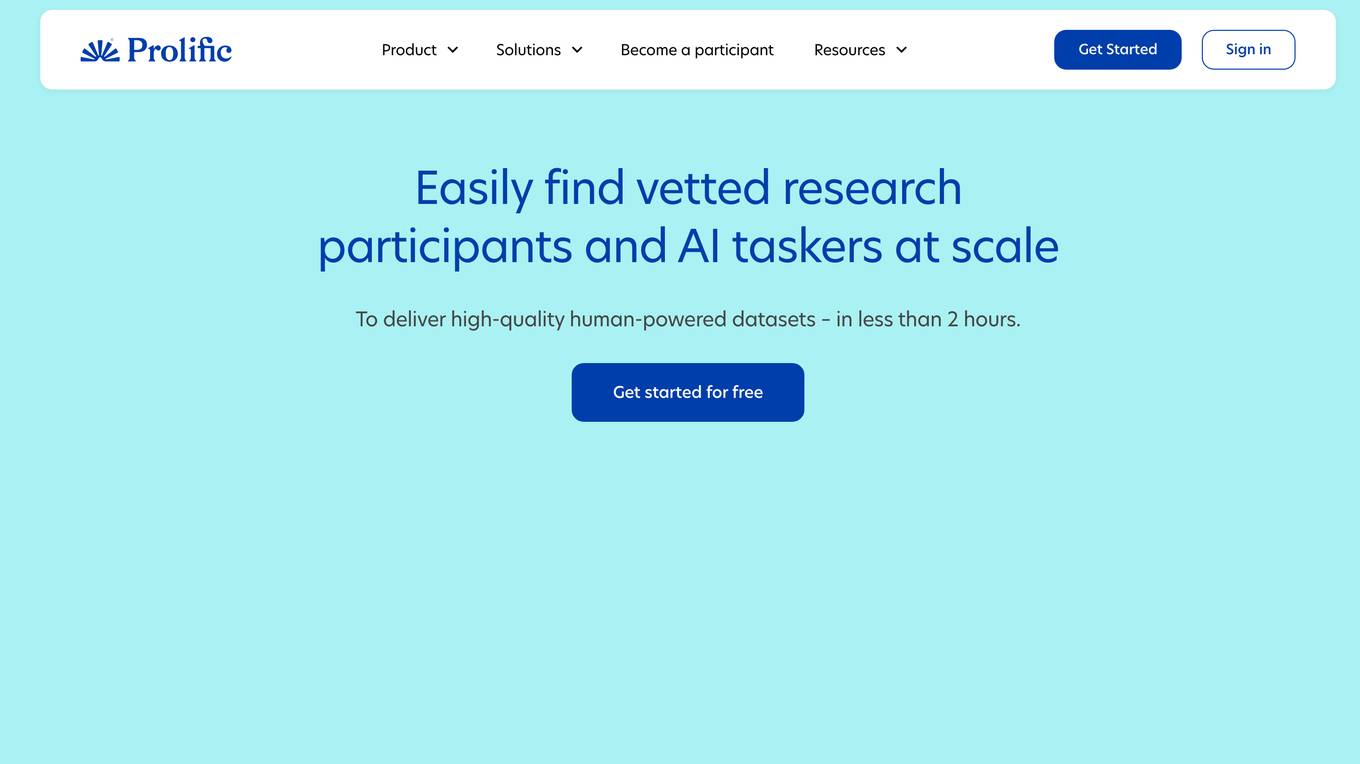
Prolific
Prolific is a platform that allows users to quickly find research participants they can trust. It offers a diverse participant pool, including domain experts and API integration. Prolific ensures high-quality human-powered datasets in less than 2 hours, trusted by over 3000 organizations. The platform is designed for ease of use, with self-serve options and scalability. It provides rich, accurate, and comprehensive responses from engaged participants, verified through manual and algorithmic quality checks.

PimEyes
PimEyes is an online face search engine that uses face recognition technology to find pictures containing given faces. It is a great tool to audit copyright infringement, protect your privacy, and find people.

Lexology
Lexology is a next-generation search tool designed to help users find the right lawyer for their needs. It offers a wide range of resources, including practical analysis, in-depth research tools, primary sources, and expert reports. The platform aims to be a go-to resource for legal professionals and individuals seeking legal expertise.

Futurepedia
Futurepedia is a leading AI resource platform dedicated to empowering professionals across various industries to leverage AI technologies for innovation and growth. Our platform offers comprehensive directories, easy-to-follow guides, a weekly newsletter, and an informative YouTube channel, simplifying AI integration into professional practices. Committed to making AI understandable and practical, we provide resources tailored to diverse professional needs, fostering a community where more than 200,000 professionals share knowledge and experiences.

GrabJobs
GrabJobs is an AI-powered job search platform that helps job seekers find the best jobs and grow their careers. With millions of job opportunities from industry-leading companies, GrabJobs makes it easy to find the perfect job for your skills and experience. Our AI-driven job recommendations and chat-based job applications make the job search process faster and more efficient. Plus, our time-saving automated applications ensure that you can apply to more jobs in less time.

Connected Papers
Connected Papers is a search engine for academic papers that uses artificial intelligence to help users find and explore relevant research. It allows users to search for papers by keyword, author, or title, and then explore the connections between them. Connected Papers also provides a variety of tools to help users organize and manage their research, including the ability to create custom collections of papers, add notes and annotations, and share their research with others.

Future Tools
Future Tools is a website that collects and organizes AI tools. It provides a comprehensive list of AI tools categorized into various domains, including AI detection, aggregators, avatar chat, copywriting, finance, gaming, generative art, generative code, generative video, image improvement, image scanning, inspiration, marketing, motion capture, music, podcasting, productivity, prompt guides, research, self-improvement, social media, speech-to-text, text-to-speech, text-to-video, translation, video editing, and voice modulation. The website also offers a search bar to help users find specific tools based on their needs.

StarByFace
StarByFace is a celebrity look-alike face recognition application that allows users to upload a photo and find their celebrity doppelganger. The application uses a Neural Network to compare the uploaded photo with a database of celebrity faces and suggests the most similar matches. It ensures privacy by not storing uploaded photos and collecting minimal personal information for website usage data only.
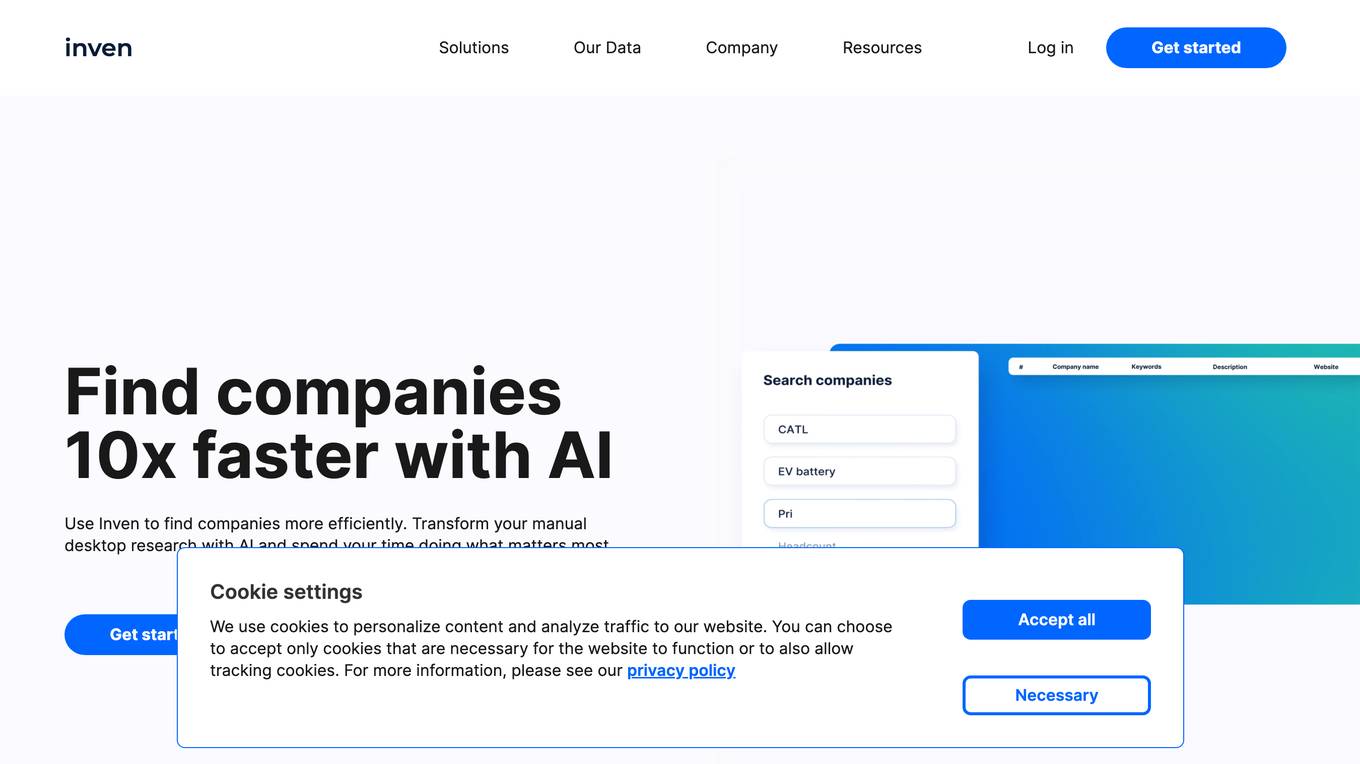
Inven
Inven is an AI-powered company data platform that helps professionals in private equity, investment banking, business brokerage, consulting, and corporate development find companies faster and more efficiently. With Inven, users can access a database of over 23 million companies and 430 million contacts in over 160 countries. Inven's AI algorithms and NLP solutions analyze millions of data points from a wide range of sources to give users actionable insights on any niche.

Prolific
Prolific is a platform that helps users quickly find research participants they can trust. It offers free representative samples, a participant pool of domain experts, the ability to bring your own participants, and an API for integration. Prolific ensures data quality by verifying participants with bank-grade ID checks, ongoing checks to identify bots, and no AI participants. The platform allows users to easily set up accounts, access rich and comprehensive responses, and scale research projects efficiently.

WinningHunter
WinningHunter is a powerful product research tool that helps you find winning products to sell online. It has a variety of features that make it easy to find products that are trending, have high sales volume, and are likely to be profitable. WinningHunter also provides data on ad spend, revenue, and other metrics to help you make informed decisions about which products to sell.
4 - Open Source AI Tools
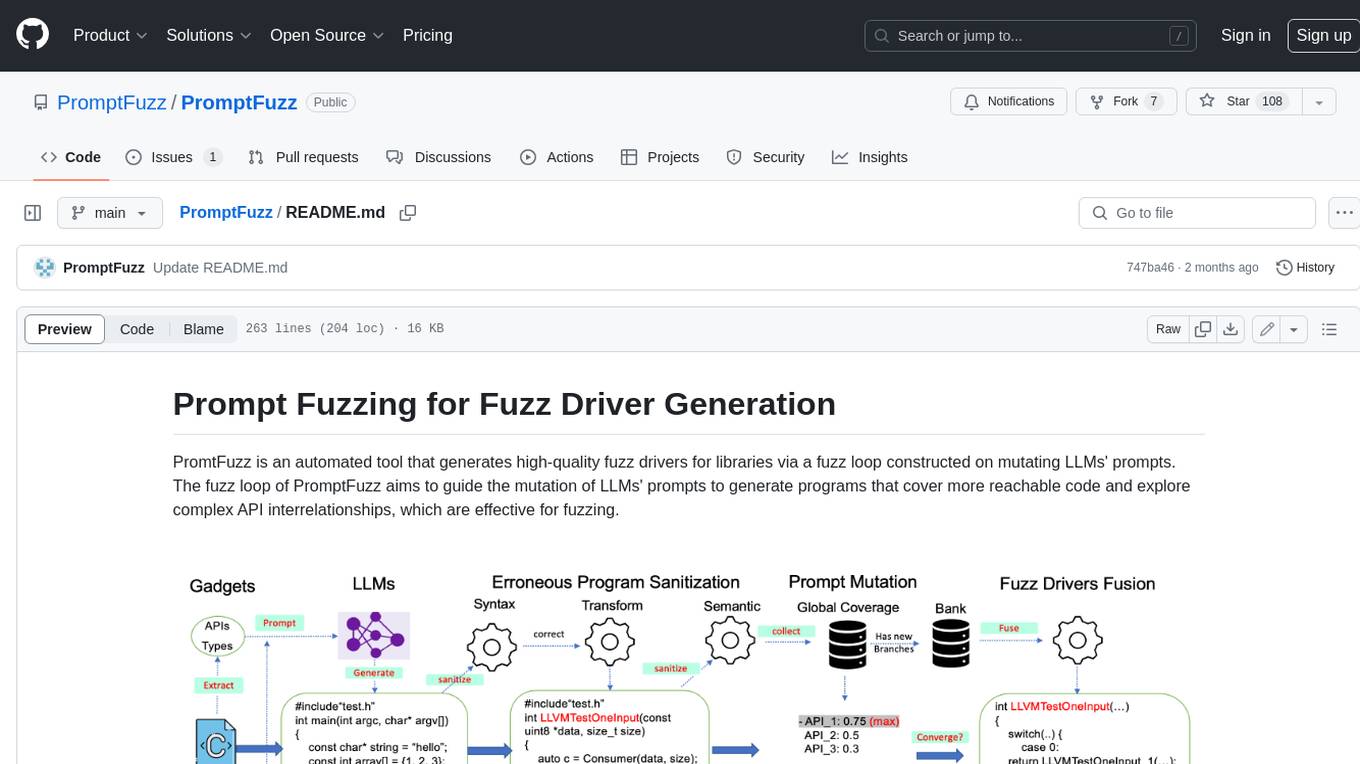
PromptFuzz
**Description:** PromptFuzz is an automated tool that generates high-quality fuzz drivers for libraries via a fuzz loop constructed on mutating LLMs' prompts. The fuzz loop of PromptFuzz aims to guide the mutation of LLMs' prompts to generate programs that cover more reachable code and explore complex API interrelationships, which are effective for fuzzing. **Features:** * **Multiply LLM support** : Supports the general LLMs: Codex, Inocder, ChatGPT, and GPT4 (Currently tested on ChatGPT). * **Context-based Prompt** : Construct LLM prompts with the automatically extracted library context. * **Powerful Sanitization** : The program's syntax, semantics, behavior, and coverage are thoroughly analyzed to sanitize the problematic programs. * **Prioritized Mutation** : Prioritizes mutating the library API combinations within LLM's prompts to explore complex interrelationships, guided by code coverage. * **Fuzz Driver Exploitation** : Infers API constraints using statistics and extends fixed API arguments to receive random bytes from fuzzers. * **Fuzz engine integration** : Integrates with grey-box fuzz engine: LibFuzzer. **Benefits:** * **High branch coverage:** The fuzz drivers generated by PromptFuzz achieved a branch coverage of 40.12% on the tested libraries, which is 1.61x greater than _OSS-Fuzz_ and 1.67x greater than _Hopper_. * **Bug detection:** PromptFuzz detected 33 valid security bugs from 49 unique crashes. * **Wide range of bugs:** The fuzz drivers generated by PromptFuzz can detect a wide range of bugs, most of which are security bugs. * **Unique bugs:** PromptFuzz detects uniquely interesting bugs that other fuzzers may miss. **Usage:** 1. Build the library using the provided build scripts. 2. Export the LLM API KEY if using ChatGPT or GPT4. 3. Generate fuzz drivers using the `fuzzer` command. 4. Run the fuzz drivers using the `harness` command. 5. Deduplicate and analyze the reported crashes. **Future Works:** * **Custom LLMs suport:** Support custom LLMs. * **Close-source libraries:** Apply PromptFuzz to close-source libraries by fine tuning LLMs on private code corpus. * **Performance** : Reduce the huge time cost required in erroneous program elimination.
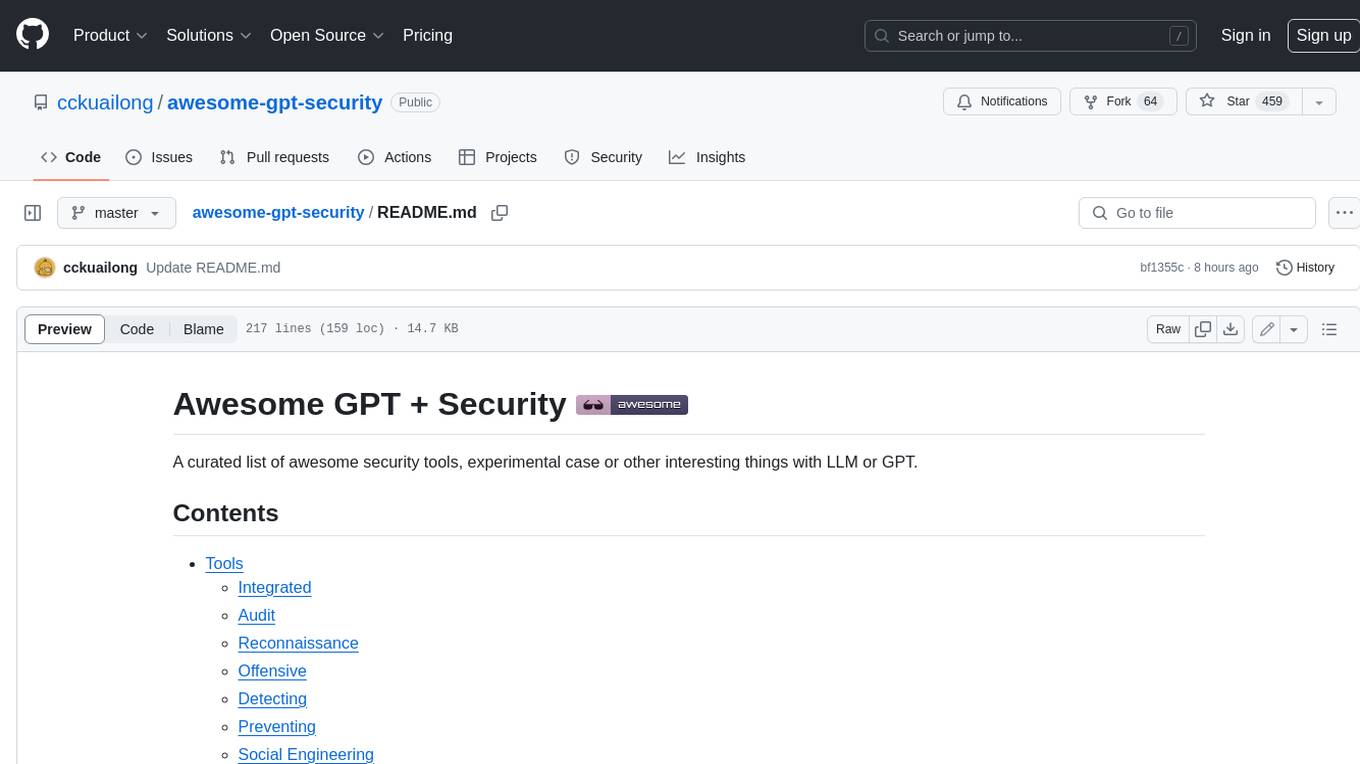
awesome-gpt-security
Awesome GPT + Security is a curated list of awesome security tools, experimental case or other interesting things with LLM or GPT. It includes tools for integrated security, auditing, reconnaissance, offensive security, detecting security issues, preventing security breaches, social engineering, reverse engineering, investigating security incidents, fixing security vulnerabilities, assessing security posture, and more. The list also includes experimental cases, academic research, blogs, and fun projects related to GPT security. Additionally, it provides resources on GPT security standards, bypassing security policies, bug bounty programs, cracking GPT APIs, and plugin security.
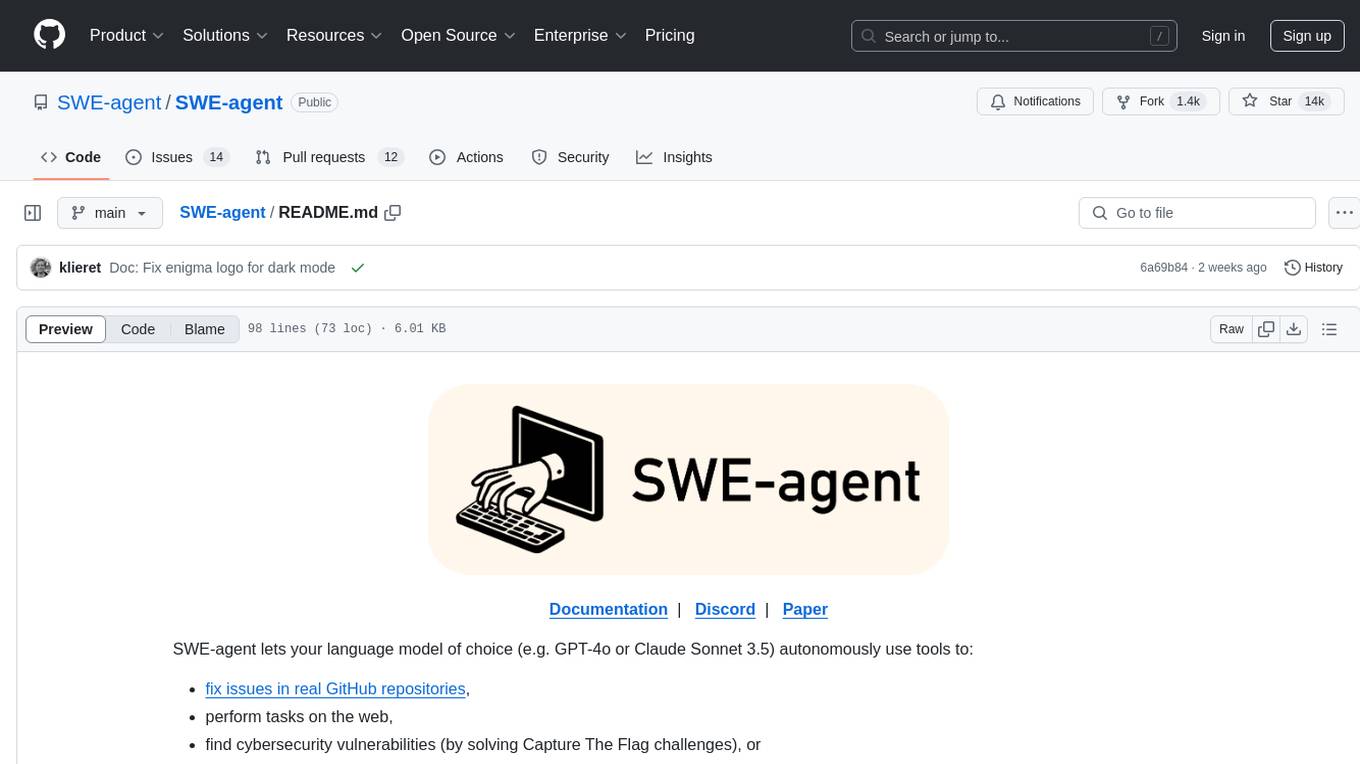
SWE-agent
SWE-agent is a tool that allows language models to autonomously fix issues in GitHub repositories, perform tasks on the web, find cybersecurity vulnerabilities, and handle custom tasks. It uses configurable agent-computer interfaces (ACIs) to interact with isolated computer environments. The tool is built and maintained by researchers from Princeton University and Stanford University.
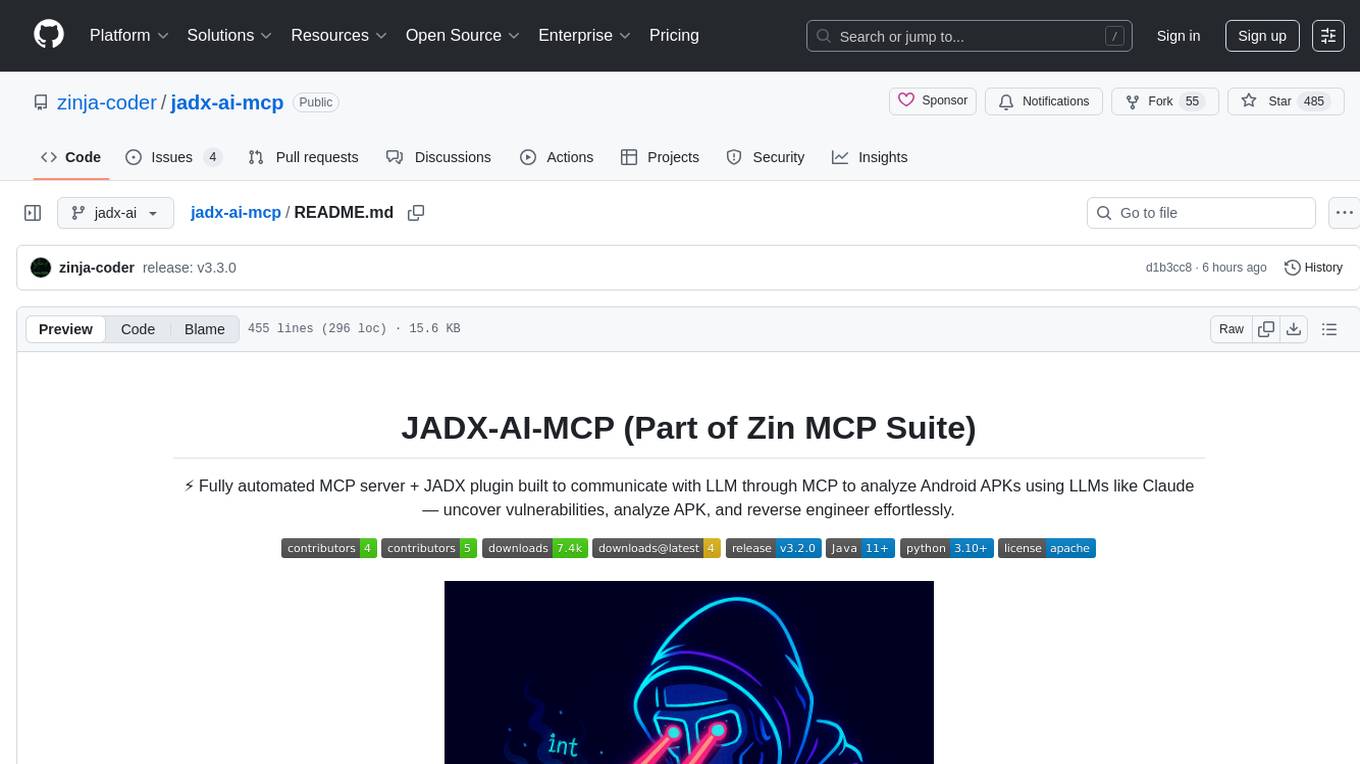
jadx-ai-mcp
JADX-AI-MCP is a plugin for the JADX decompiler that integrates with Model Context Protocol (MCP) to provide live reverse engineering support with LLMs like Claude. It allows for quick analysis, vulnerability detection, and AI code modification, all in real time. The tool combines JADX-AI-MCP and JADX MCP SERVER to analyze Android APKs effortlessly. It offers various prompts for code understanding, vulnerability detection, reverse engineering helpers, static analysis, AI code modification, and documentation. The tool is part of the Zin MCP Suite and aims to connect all android reverse engineering and APK modification tools with a single MCP server for easy reverse engineering of APK files.
20 - OpenAI Gpts
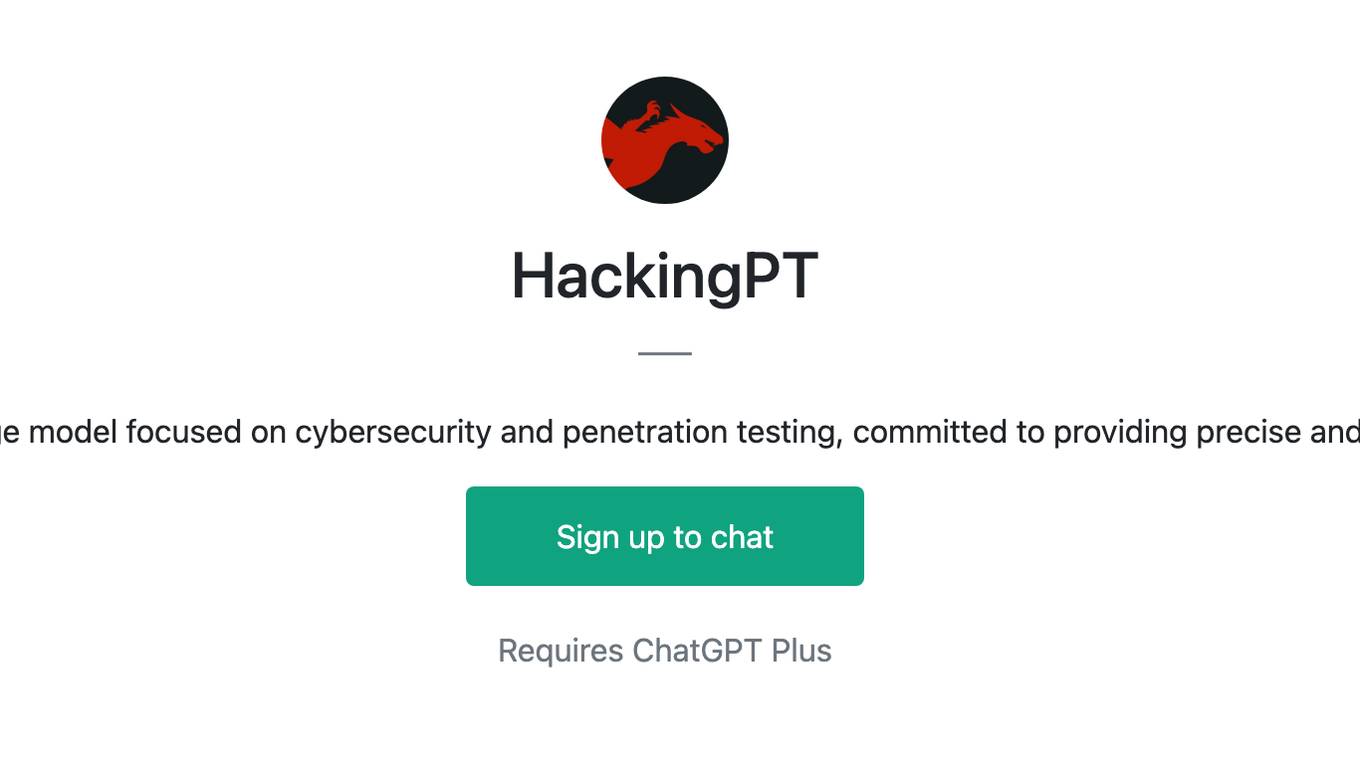
HackingPT
HackingPT is a specialized language model focused on cybersecurity and penetration testing, committed to providing precise and in-depth insights in these fields.
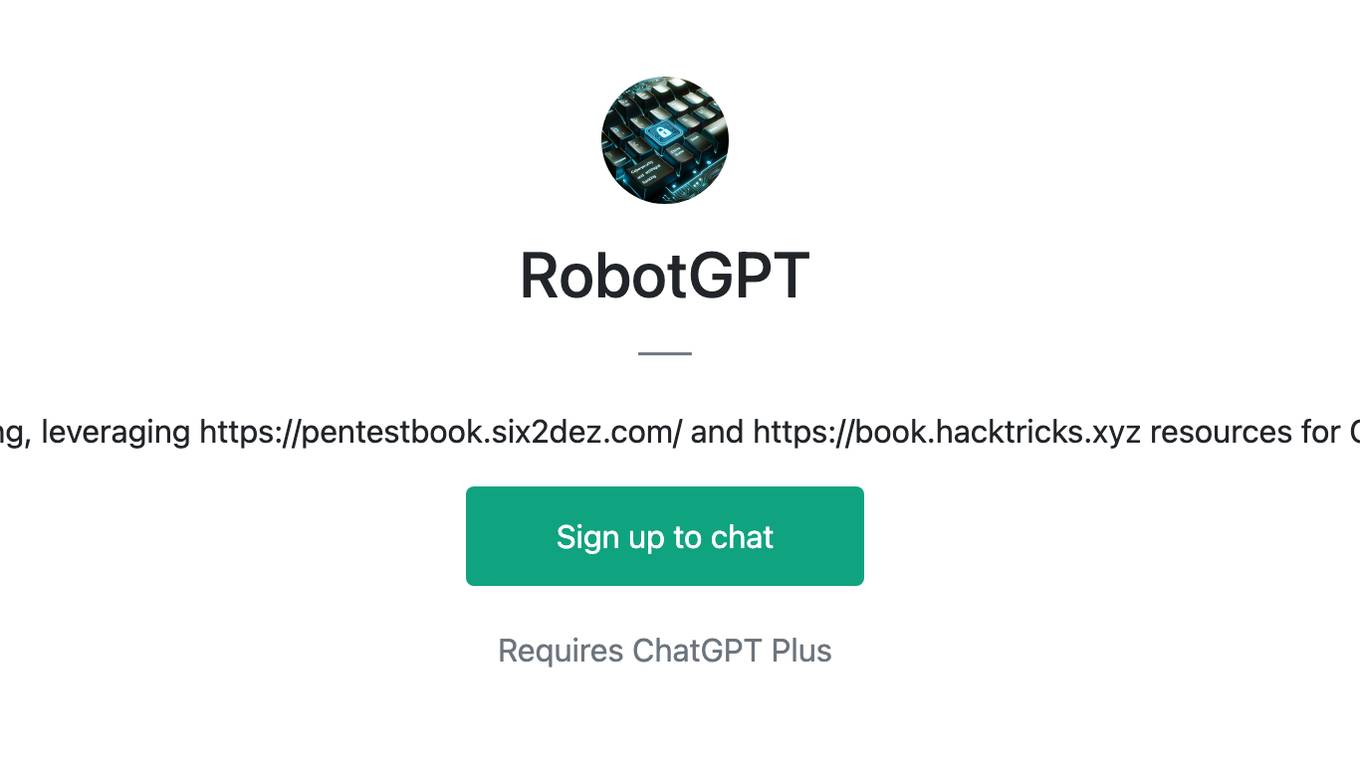
RobotGPT
Expert in ethical hacking, leveraging https://pentestbook.six2dez.com/ and https://book.hacktricks.xyz resources for CTFs and challenges.
PentestGPT
A cybersecurity expert aiding in penetration testing. Check repo: https://github.com/GreyDGL/PentestGPT

IDA Pro Plugins recommendation expert.
Ask me to recommend a plugin or script from the official Hex-Rays plugin repository

IAC Code Guardian
Introducing IAC Code Guardian: Your Trusted IaC Security Expert in Scanning Opentofu, Terrform, AWS Cloudformation, Pulumi, K8s Yaml & Dockerfile
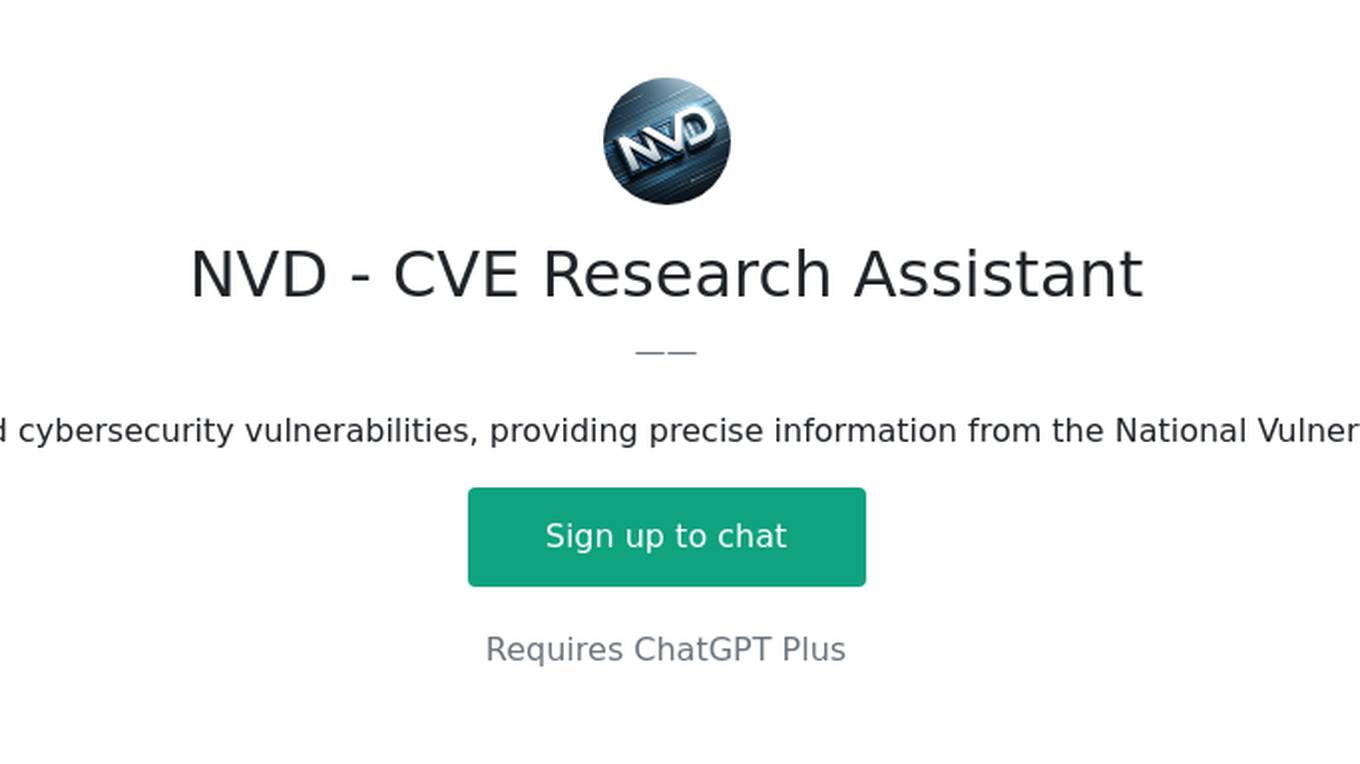
NVD - CVE Research Assistant
Expert in CVEs and cybersecurity vulnerabilities, providing precise information from the National Vulnerability Database.
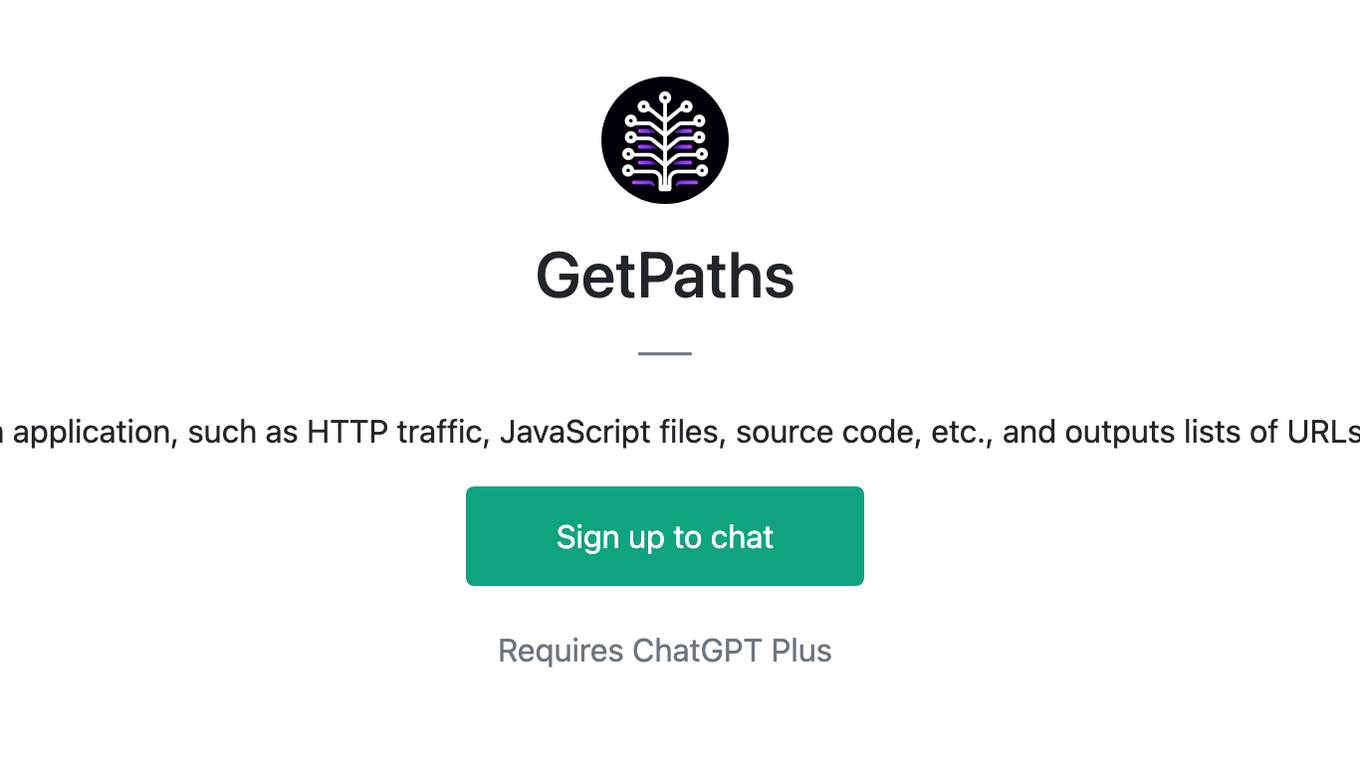
GetPaths
This GPT takes in content related to an application, such as HTTP traffic, JavaScript files, source code, etc., and outputs lists of URLs that can be used for further testing.

Solidity Contract Auditor
Auditor for Solidity contracts, focusing on security, bug-finding and gas efficiency.

Find a Lawyer
Assists in finding suitable lawyers based on user needs. Disclaimer - always do your own extra research

